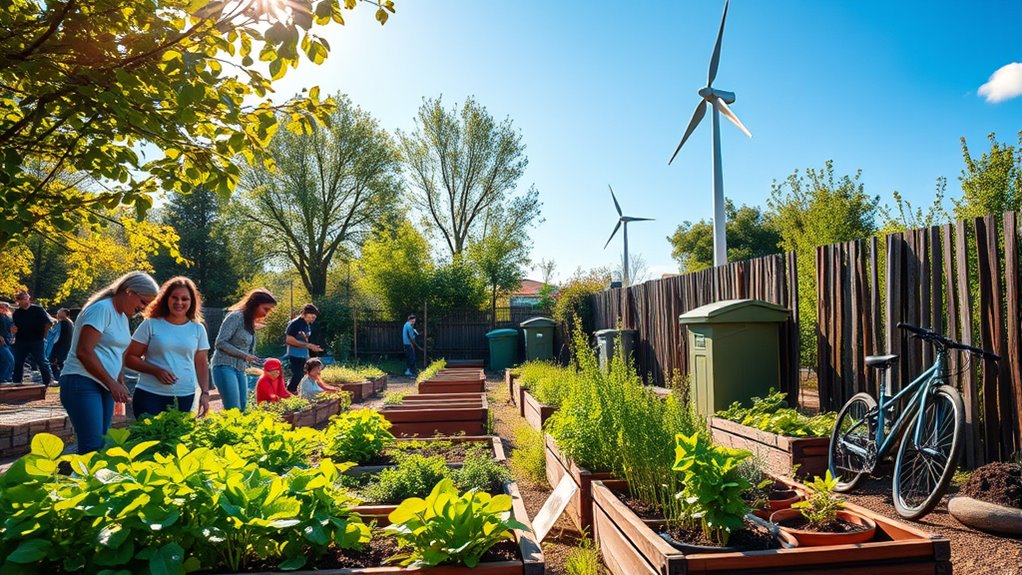Sustainable living can be summed up with eight powerful quotes that remind you of your role in protecting the planet. They emphasize that the Earth is a shared responsibility, and small actions like conserving water, recycling, and choosing eco-friendly products make a big difference. These quotes inspire you to act responsibly, support community efforts, and prioritize sustainability in daily choices. If you want to understand how to live more sustainably, these insightful words offer great guidance to start your journey.
Key Takeaways
- Emphasizes shared responsibility for the environment and the importance of small, impactful actions.
- Highlights community empowerment, ethical sourcing, and sustainable innovations like renewable energy.
- Stresses individual choices such as reducing waste, conserving resources, and supporting eco-friendly products.
- Urges urgent collective action, moving from harm reduction to active environmental restoration.
- Reinforces the significance of mindful living, early education, and proactive behavior for a sustainable future.
“The Earth Does Not Belong to Us: We Belong to the Earth” – Chief Seattle

Chief Seattle’s quote reminds us that the Earth isn’t something we own; instead, we are stewards of it. This perspective encourages you to value sustainable practices like urban agriculture, which transforms city spaces into productive, green areas. By growing your own food locally, you reduce reliance on long-distance transportation and help conserve renewable resources. When you prioritize renewable resources—such as solar energy, rainwater harvesting, and composting—you minimize environmental impact and support the planet’s natural balance. Recognizing that you belong to the Earth, not the other way around, prompts you to take responsibility. Small actions, like supporting urban farms or choosing renewable energy sources, make a significant difference in preserving the environment for future generations.
“We Don’t Need a Handout, We Need a Hand” – Unknown
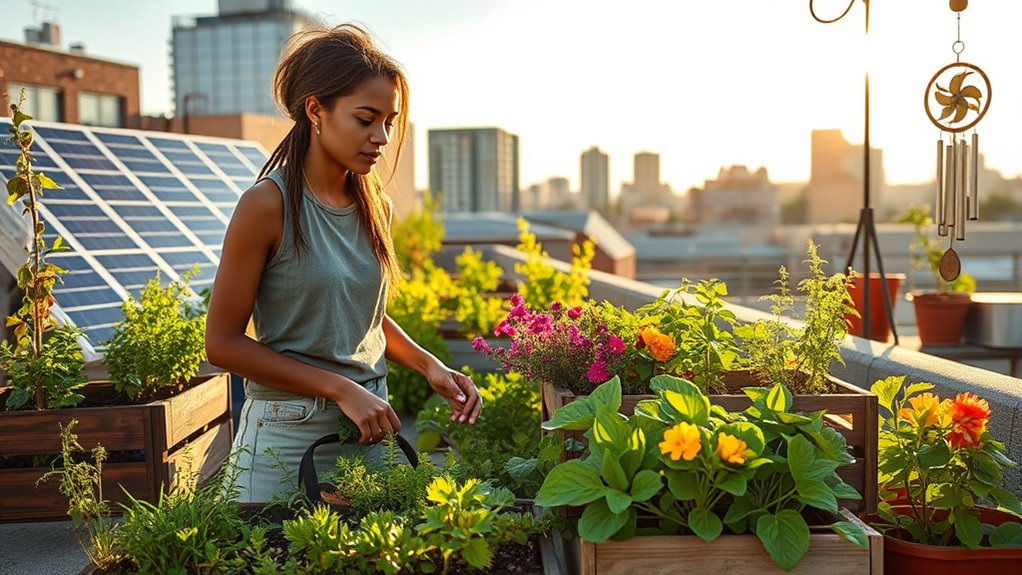
Instead of just giving aid, focus on empowering communities to support themselves. By backing fair livelihoods and genuine assistance, you help build resilience and independence. This approach guarantees sustainable change rather than temporary fixes. Incorporating community-driven solutions ensures long-term benefits and fosters self-sufficiency.
Empowering Local Communities
Empowering local communities means recognizing their strength and potential rather than simply giving handouts. When you focus on community resilience, you help communities develop the skills and resources to withstand challenges independently. Local ownership is key; it ensures that community members take charge of their development, making decisions that reflect their needs and values. By encouraging local leadership, you foster a sense of pride and responsibility that drives sustainable progress. This approach builds trust and strengthens social bonds, creating a foundation for long-term stability. Instead of dependency, you cultivate self-reliance. Your role is to support initiatives that empower residents to harness their assets and knowledge, transforming communities into active agents of their own growth and resilience.
Supporting Fair Livelihoods
Supporting fair livelihoods means recognizing that sustainable development depends on creating opportunities for people to earn a living with dignity and stability. Fair trade practices ensure producers receive fair compensation, empowering communities and fostering economic growth. Ethical sourcing guarantees that products are made responsibly, respecting workers’ rights and the environment. By choosing fair trade, you support transparent supply chains that prioritize workers’ well-being over profit. This approach helps reduce exploitation and builds resilient local economies. You play a crucial role by demanding products that are ethically sourced, encouraging companies to adopt fair trade standards. Supporting fair livelihoods isn’t just about charity; it’s about creating a fair system where everyone can thrive through honest work and sustainable practices. Your choices make a difference.
Promoting Genuine Assistance
Promoting genuine assistance means focusing on sustainable solutions that enable individuals and communities to become self-reliant, rather than simply providing temporary relief. You can do this by actively engaging with communities to understand their needs and empower them to take ownership of their development. Encouraging ethical consumption is also essential, as it supports responsible production and reduces dependency on external aid. When you prioritize long-term strategies over quick fixes, you foster resilience and independence. Genuine assistance isn’t about giving a handout; it’s about offering tools, knowledge, and opportunities that help people build a better future. Recognizing recurring patterns, such as angel numbers, can also serve as spiritual guidance to inform your approach. By fostering community engagement and promoting ethical consumption, you contribute to a more equitable and sustainable world where everyone has the chance to thrive on their own terms.
“What You Do Makes a Difference, and You Have to Decide What Kind of Difference You Want to Make” – Jane Goodall
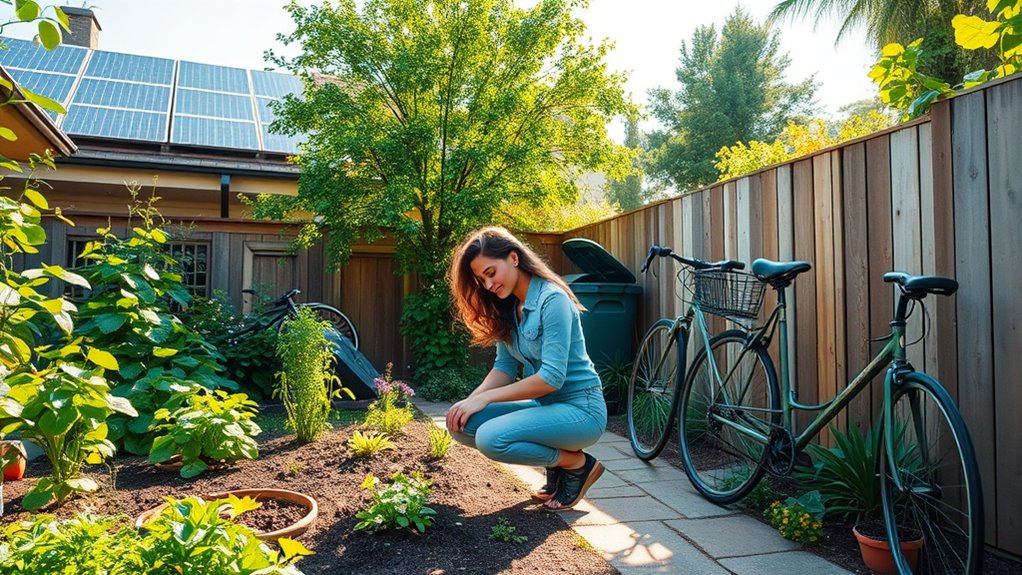
Your actions have a direct impact on the environment, so you need to take personal responsibility for your choices. Every decision you make shapes the world around you, whether big or small. Consider what kind of difference you want to leave behind and act accordingly. Embracing creative practice can also help you explore new ways to make a positive impact through innovative solutions.
Subheading 1: Personal Responsibility Matters
Every individual has the power to influence the environment through everyday choices, making personal responsibility a crucial aspect of sustainable living. You can reduce your carbon footprint by opting for renewable energy sources when possible, like solar or wind power. Waste reduction is equally important—rethink packaging, reuse items, and compost organic waste. Small actions, like turning off unused electronics and conserving water, add up over time. Your choices directly impact resource consumption and pollution levels. By taking responsibility for your habits, you create a ripple effect that encourages others to do the same. Remember, sustainable living isn’t just about big decisions; it’s about everyday habits that reflect your commitment to a healthier planet. Forsale 100 Your actions truly make a difference.
Subheading 2: Making Impact Choices
Making intentional choices about how you live and consume is essential because the impact of your actions extends far beyond your immediate environment. When you adopt eco-friendly habits, you reduce your carbon footprint and support sustainable practices. Practicing conscious consumerism means choosing products that prioritize ethical sourcing, minimal packaging, and durability. Every purchase is an opportunity to make a positive difference—whether it’s opting for reusable bags, buying local, or reducing waste. Your decisions shape the market and influence others to follow suit. Remember, small changes add up. By consciously selecting eco-friendly habits and practicing mindful consumption, you become part of a larger movement toward sustainability. Paying attention to the contrast ratio of your home entertainment devices ensures a better viewing experience that minimizes energy use. What kind of difference do you want to make? Your choices define the impact you leave behind.
“The Greatest Threat to Our Planet Is the Belief That Someone Else Will Save It” – Robert Swan
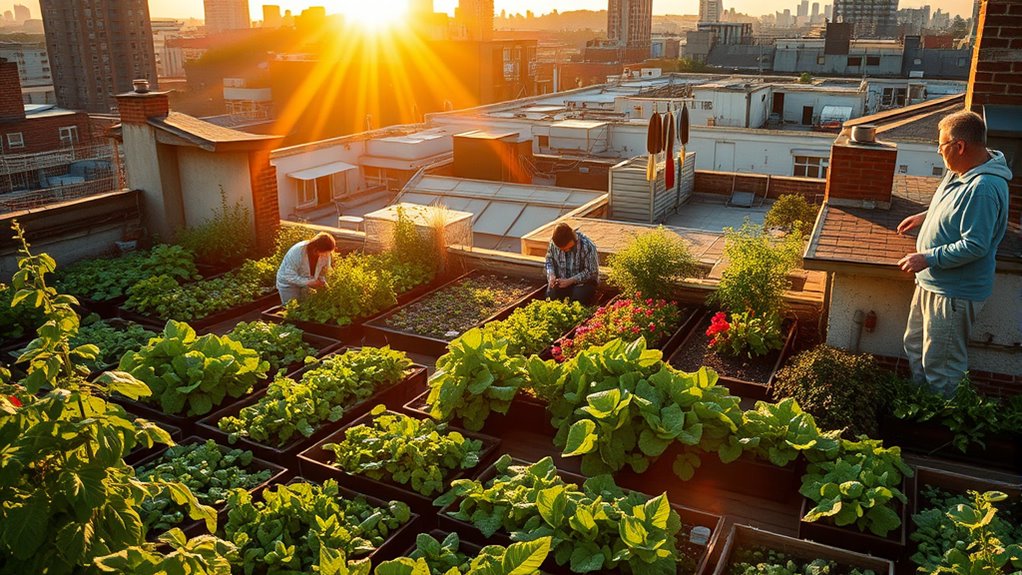
Have you ever considered how the belief that someone else will take care of environmental problems might be the biggest obstacle to change? Relying on others delays action, preventing you from making a real difference. Instead, focus on what you can do now, like adopting renewable energy sources and reducing waste. By investing in solar panels or wind power, you contribute to a cleaner future. Waste reduction, through recycling and mindful consumption, minimizes environmental strain. Remember, waiting for governments or corporations to lead isn’t enough; individual actions drive collective change. Your choices matter. When everyone takes responsibility, the myth that someone else will save the planet dissolves. Change begins with you—small steps add up to a powerful movement for sustainability.
“Sustainability Is No Longer About Doing Less Harm. It’s About Doing More Good” – Jochen Zeitz
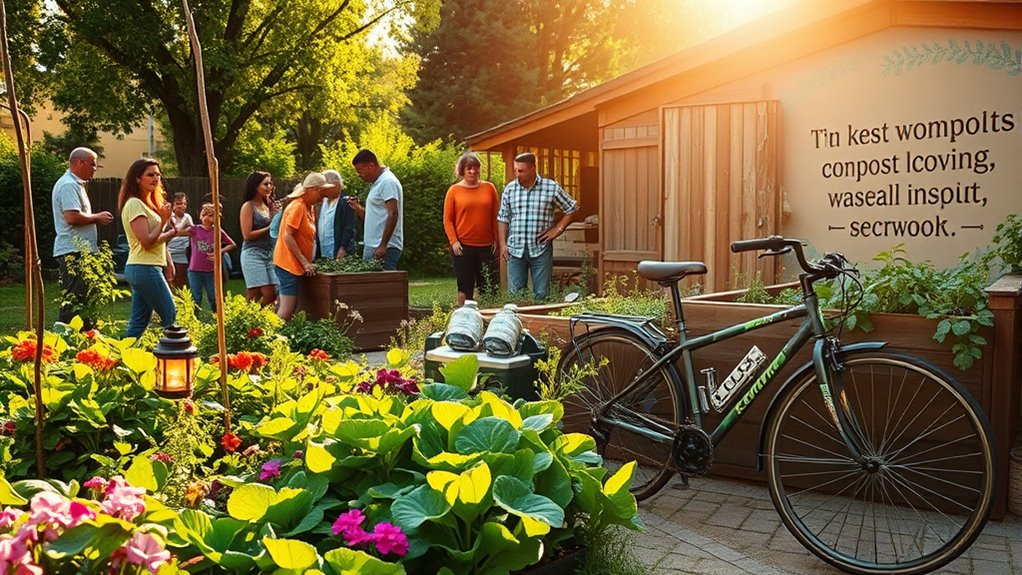
Is sustainability still just about reducing harm? Not anymore. Today, it’s about actively doing more good. You can make a difference by investing in renewable energy sources like solar or wind, which power your life while reducing carbon emissions. Waste reduction also plays a vital role; minimizing what you throw away helps protect ecosystems and conserves resources. Moving beyond merely avoiding damage, you can support initiatives that restore damaged environments and promote social equity. Every choice, from sustainable shopping to energy use, contributes to a larger positive impact. By shifting your mindset from doing less harm to doing more good, you help create a healthier planet for future generations. It’s about taking proactive steps that foster regeneration and positive change. Incorporating sustainable practices into daily life is essential for meaningful progress.
“Live Simply So That Others May Simply Live” – Mahatma Gandhi
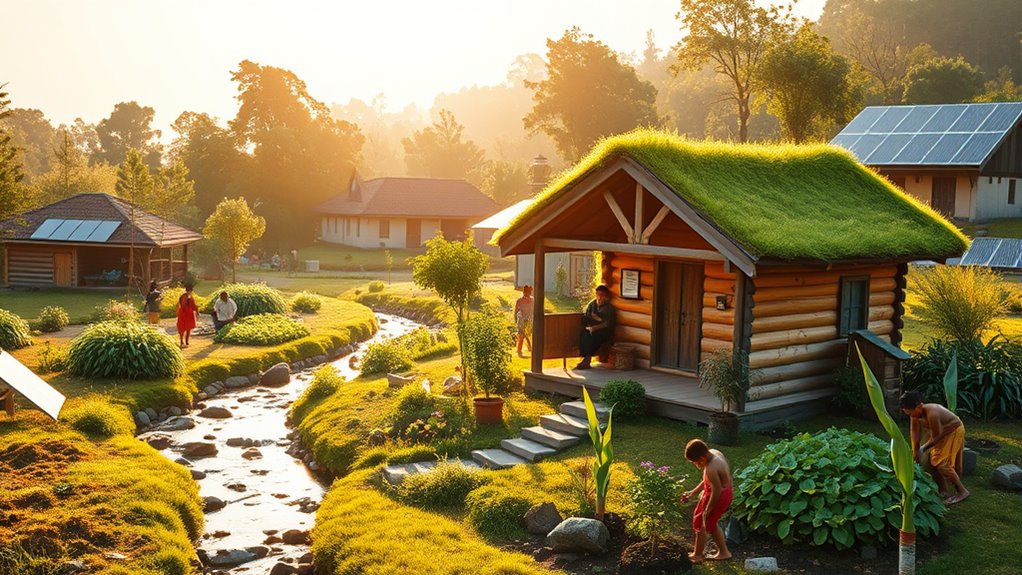
Living simply enables you to reduce your ecological footprint while ensuring that others can access essential resources. Embracing eco-friendly habits, like using less plastic and conserving energy, directly supports Gandhi’s call for simplicity. When you prioritize sustainable innovation—such as choosing renewable energy or supporting fair-trade products—you contribute to a more equitable world. Living this way encourages mindful consumption, which benefits both the planet and its people. By simplifying your lifestyle, you make space for essentials and reduce waste, helping preserve natural resources. Your choices demonstrate that sustainable living isn’t about deprivation but about intentionality. Incorporating bike commuting into your routine can also significantly decrease your carbon emissions. When you live simply, you set an example that inspires others to adopt eco-friendly habits, creating a ripple effect toward a more just and sustainable future for all.
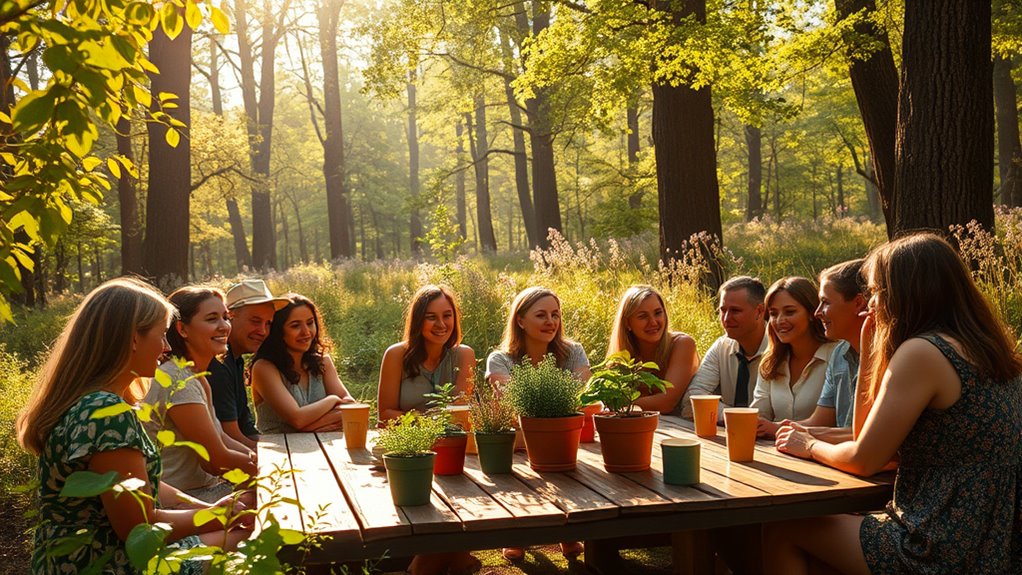
The environment serves as a shared space where everyone’s actions and choices directly affect one another. By adopting eco-conscious habits, you can reduce your impact and inspire others to do the same. Small changes, like recycling, conserving water, and using sustainable products, create a ripple effect that benefits everyone. Community engagement is key—when you work with neighbors or local groups, you amplify your efforts and build a collective sense of responsibility. Remember, the environment isn’t just nature; it’s where we live, work, and connect. Recognizing this mutual interest motivates you to make mindful decisions every day, knowing that your actions contribute to a healthier, more sustainable world for all of us.
“Every Choice Counts—Choose Green” – Unknown
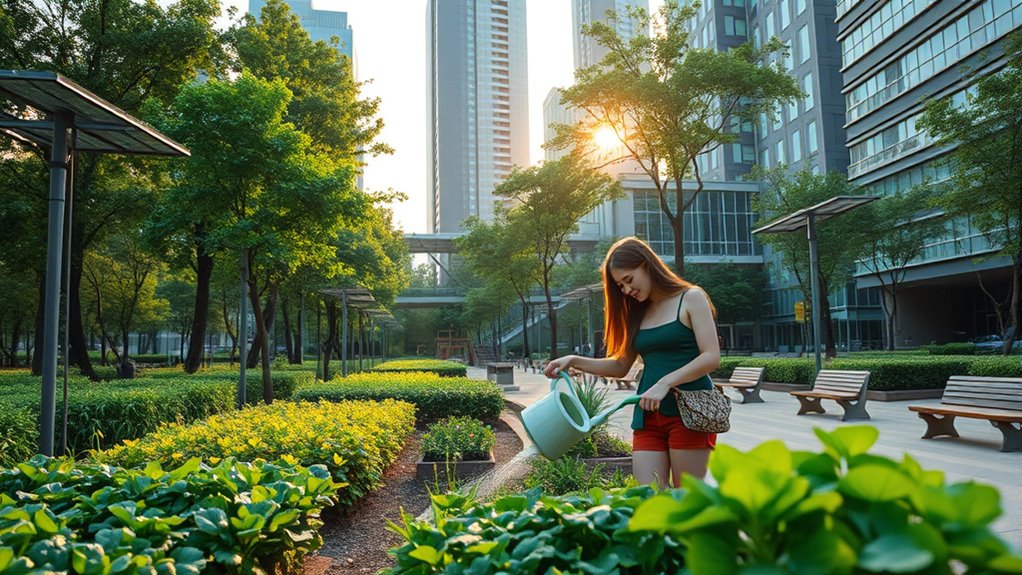
Every decision you make has the power to shape a more sustainable world. By adopting eco-friendly habits, you reduce your environmental impact and inspire others to follow suit. Simple choices, like using reusable bags, conserving water, or opting for energy-efficient appliances, make a meaningful difference. Embracing sustainable innovation—such as supporting renewable energy sources or investing in eco-friendly products—further amplifies your positive effect. Remember, every small step adds up; your everyday actions can drive larger change. When you choose green options, you’re not only protecting the planet but also fostering a culture of sustainability. Incorporating educational toys that promote environmental awareness in early childhood can help cultivate eco-conscious values from a young age. Your choices matter more than you realize, and by acting consciously, you become part of the solution for a healthier, more sustainable future.
Frequently Asked Questions
How Can Individuals Effectively Promote Sustainability in Daily Life?
To promote sustainability daily, you can adopt eco-friendly habits and practice mindful consumption. Start by reducing waste, recycling, and choosing sustainable products. Use energy wisely and opt for reusable items. Spread awareness by sharing your efforts, inspiring others to join. Small actions add up, so stay committed and make conscious choices. Your consistent efforts can create a ripple effect, encouraging a more sustainable lifestyle for everyone around you.
What Are the Most Impactful Actions for Reducing Ecological Footprints?
Did you know that transportation accounts for nearly 15% of global emissions? To reduce your ecological footprint, focus on eco-friendly transportation options like biking, walking, or using public transit. Additionally, supporting renewable energy adoption in your home can make a big difference. These actions cut emissions considerably and promote sustainability, helping protect the planet for future generations. Small daily choices truly have a powerful impact.
How Can Communities Encourage Collective Environmental Responsibility?
You can encourage collective environmental responsibility by promoting community composting programs and eco-friendly initiatives. Get neighbors involved in composting yard waste and food scraps, making it easy and accessible. Organize workshops to educate residents on sustainability practices and highlight the benefits of eco-friendly initiatives. When everyone participates, your community creates a stronger, greener environment, inspiring others and fostering a shared commitment to protecting the planet.
In What Ways Can Businesses Contribute to Sustainable Living?
You might wonder how businesses can promote sustainable living, and the truth is, they’re vital. By embracing green innovation and supporting eco entrepreneurship, companies reduce their environmental impact and inspire others to follow suit. When you prioritize sustainable practices, you create a ripple effect, encouraging innovations that benefit the planet. Your business can lead the way, demonstrating that profitability and sustainability go hand in hand, shaping a healthier future for all.
What Policies Support Long-Term Environmental Stewardship?
You can support long-term environmental stewardship by advocating for strong policy frameworks and legislative initiatives. These policies set clear standards for reducing emissions, conserving resources, and protecting ecosystems. By pushing for laws that promote renewable energy, waste reduction, and conservation efforts, you help guarantee sustainable practices become integral to society. Engaging in policy discussions and holding leaders accountable drives the adoption of initiatives that prioritize the planet’s health for future generations.
Conclusion
Think of the Earth as a garden you tend daily. Every choice you make is a seed you plant—some grow into beauty, others into weeds. By embracing sustainable habits, you become a gardener of the planet’s future. Remember, your actions ripple outward, shaping a healthier world. You hold the watering can—so, choose to nurture growth, not decay. Together, we can cultivate a world where nature and humanity flourish side by side.
Joy, as our Editor in Chief, ensures the highest standard of content. Her talent in writing is complemented by her attention to detail and passion for literature and culture. Joy’s expertise and love for the English language shine through in her editorial work, making each piece a testament to quality and clarity.
